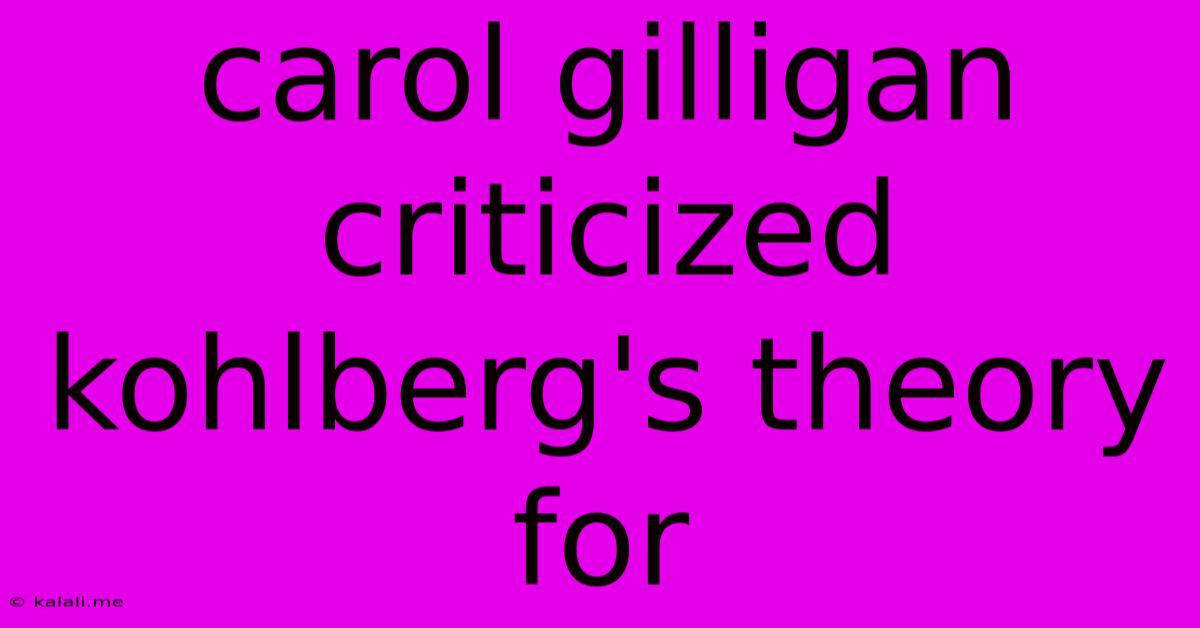Carol Gilligan Criticized Kohlberg's Theory For
Kalali
Jun 12, 2025 · 3 min read

Table of Contents
Carol Gilligan's Critique of Kohlberg's Theory of Moral Development
Carol Gilligan, a prominent feminist psychologist, famously criticized Lawrence Kohlberg's stages of moral development, arguing that his theory was biased against women. Kohlberg's framework, while influential, failed to adequately account for the differences in moral reasoning between men and women, a gap Gilligan sought to address. This article delves into the core of Gilligan's critique, exploring the limitations of Kohlberg's model and the alternative perspective she proposed.
Kohlberg's theory posits six distinct stages of moral development, progressing from a focus on self-interest to a universal ethical principle. He primarily based his research on interviews with predominantly male subjects, a factor Gilligan highlighted as a critical flaw. She argued that this skewed sample led to a biased understanding of moral reasoning, specifically overlooking the distinct moral orientations often exhibited by women.
Kohlberg's Focus on Justice vs. Gilligan's Emphasis on Care
A central point of Gilligan's critique revolves around Kohlberg's emphasis on justice as the primary framework for moral decision-making. Kohlberg's highest stages emphasize abstract principles of justice, fairness, and individual rights. Gilligan contended that this framework, while valid, doesn't fully capture the moral reasoning of many women, who often prioritize care, empathy, and responsibility in their ethical considerations.
Gilligan observed that women often demonstrate a different moral orientation, focusing on maintaining relationships, avoiding harm, and considering the needs of others. This isn't to say that women don't value justice; rather, Gilligan argued that their moral reasoning often stems from a different ethical framework, one centered on care and interconnectedness. This perspective is often referred to as the ethics of care.
The Stages of the Ethics of Care
In contrast to Kohlberg's justice-oriented stages, Gilligan proposed her own framework, outlining three levels of moral development rooted in the ethics of care:
- Level 1: Self-interest: This stage focuses on survival and self-preservation. Moral decisions are guided by what is best for the individual.
- Level 2: Self-sacrifice: At this level, individuals prioritize the needs of others above their own. This often manifests as a strong sense of responsibility and a desire to please others.
- Level 3: Nonviolence: This represents the highest level of moral development in Gilligan's framework, emphasizing care for both oneself and others. Decisions are guided by a principle of nonviolence and a commitment to minimizing harm.
Beyond Gender: A Broader Critique
While Gilligan's work initially focused on gender differences, her critique extends beyond a simple male-female dichotomy. Her work highlights the limitations of a single moral framework and suggests that multiple perspectives are necessary for a complete understanding of moral development. The ethics of care offers a valuable counterpoint to the justice perspective, suggesting that both are crucial for navigating complex ethical dilemmas.
Criticisms of Gilligan's Work
It's important to acknowledge that Gilligan's work has not been without criticism. Some argue that her research methodology lacks the rigor of Kohlberg's, and that the differences she observed might be due to factors other than gender, such as social roles or upbringing. Others question the universality of her stages, suggesting that they may not apply equally across different cultures and contexts.
Despite these criticisms, Gilligan's work remains highly influential. Her critique of Kohlberg's theory broadened our understanding of moral development, highlighting the importance of considering diverse moral perspectives and the limitations of relying on a single framework. Her emphasis on the ethics of care continues to be a vital component in ethical discussions across diverse fields. By incorporating both justice and care perspectives, we can achieve a more nuanced and comprehensive approach to moral reasoning.
Latest Posts
Latest Posts
-
5 Miles Is How Many Meters
Jun 13, 2025
-
What Is Cube Root Of 4
Jun 13, 2025
-
Which Of The Following Statements Best Describes
Jun 13, 2025
-
What Is The Roman Numeral Lviii
Jun 13, 2025
-
Which Of The Following Best Describes An Intranet
Jun 13, 2025
Related Post
Thank you for visiting our website which covers about Carol Gilligan Criticized Kohlberg's Theory For . We hope the information provided has been useful to you. Feel free to contact us if you have any questions or need further assistance. See you next time and don't miss to bookmark.